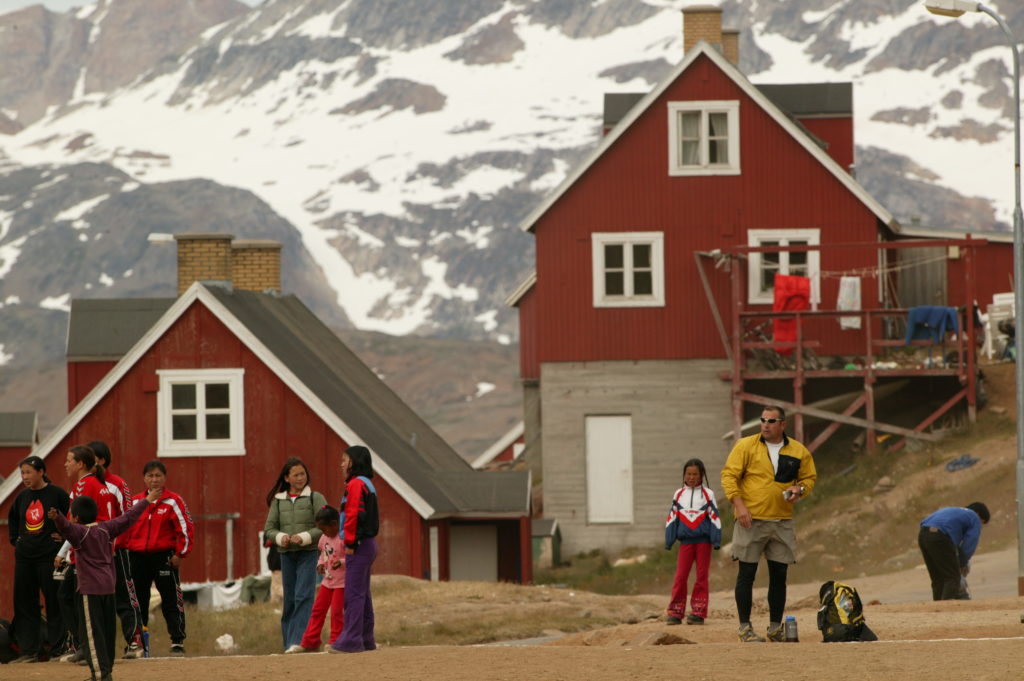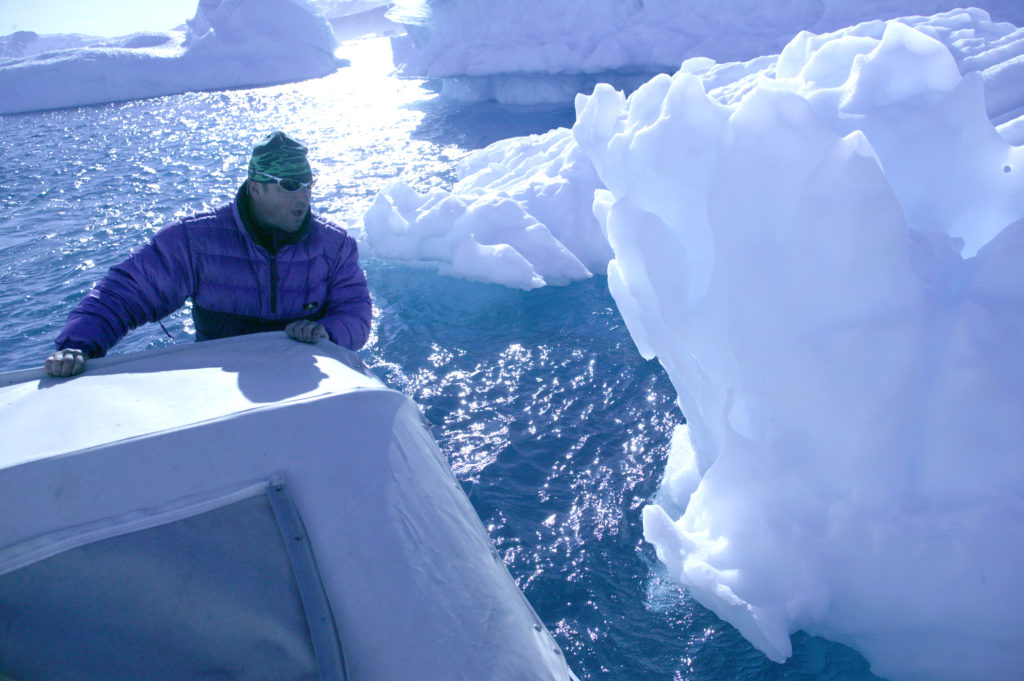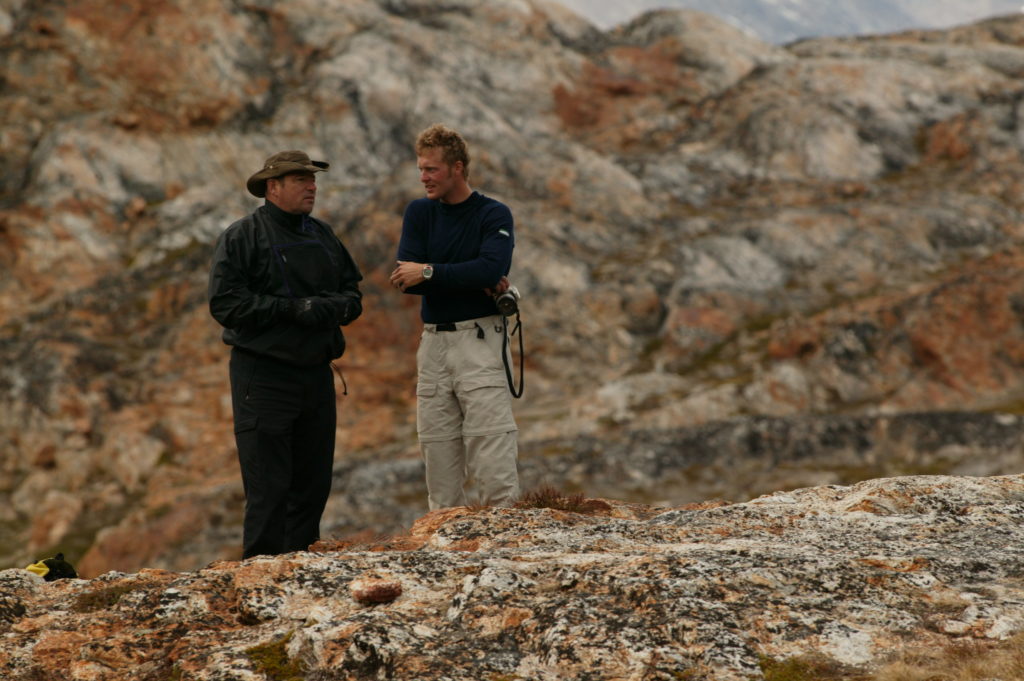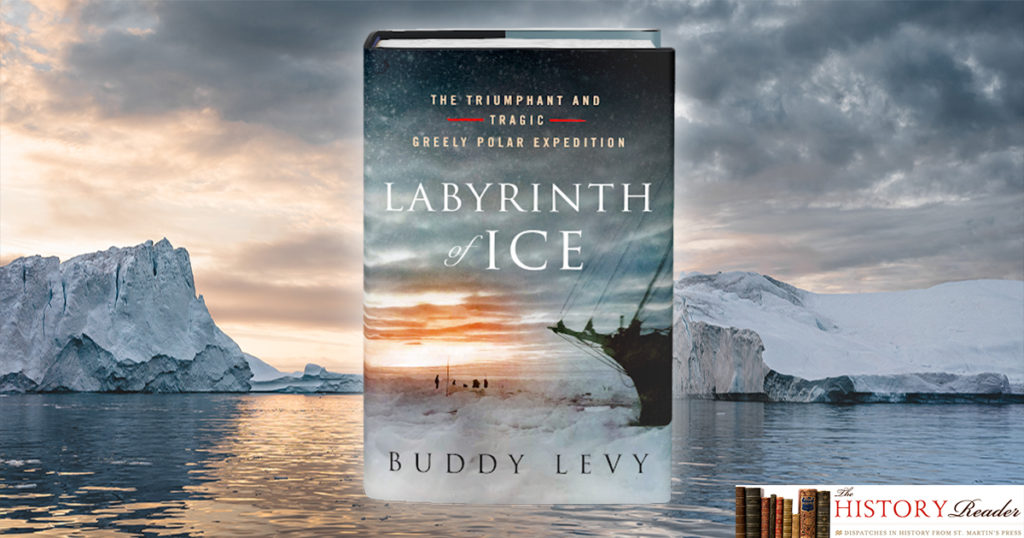In celebration of his new book, Labyrinth of Ice, we talked with author Buddy Levy to learn a little bit more about his research, journey, and what attracted him to this project. The following Q&A is a candid conversation about the retelling of the Greely Expedition, a harrowing adventure in the Arctic North.

Photo credit: Tony Di Zinno
Labyrinth of Ice required extensive research. Did you do any traveling or visit any exciting places while researching the book?
I have been fortunate to travel to some amazing places doing research for my books. The two favorites are the Amazon rainforest and Greenland, the latter of which figures prominently in Labyrinth of Ice. I drew extensively from an experience I had traveling in Greenland, where I spent a few weeks in a dramatic and enchanting village called Tasiilaq, on the southeastern shore of the island. I trekked through the mountains for many days and traveled the fiords by boat among enormous icebergs, absolutely awed by the size, scope, and danger of the place.
The physical, on-the-ground experience proved incredibly useful for Labyrinth of Ice, aiding my descriptions of the landscapes that Greely and his men encountered on their many explorations of discovery. Seeing the vast expanses, summiting jagged peaks, and moving by boat through berg-strewn, freezing waters was exhilarating and gave me a real insight and connection to the Arctic north.
What attracted you to the story of Greely’s expedition?
I was attracted to the Greely Expedition because of how unique it was, combining exploration and an attempt to the North Pole with serious scientific inquiry. Greely and his men were able to conduct two years of experiments—measuring ice and snow depths, tidal movements, magnetism, atmospheric, air and water temperatures—while also making profoundly difficult expeditions into previously unknown lands and seas. And embedded into all of this was an incredible survival and rescue story.
How long did it take you to put this book together?
It took about two years for me to research and write the book.
Was there anything you learned about Greely’s expedition that shocked you?
There were a couple of shocking revelations for me. One was the cannibalism, of course. I’ve long held a fascination with cannibalism, having read various accounts of the Donner Party as well as following the 1972 plane crash in the Andes, in which survivors resorted to cannibalism to stay alive. The other thing that was pretty shocking was the inaction on the part of the U.S. government to expedite rescue missions. Robert Todd Lincoln—Abraham Lincoln’s first son and Secretary of War—was against Arctic exploration because it was expensive and dangerous. His foot dragging held up aid and action when it was most needed. The sloth of governmental bureaucracy doomed a number of Greely’s men.

Can you explain why Greely’s discoveries are still important and relevant today?
Many of Greely’s discoveries bear relevance today, particularly in light of the pervasive global warming and melting polar ice. Greely recorded some 500 daily readings for two consecutive years—and current scientists are able to compare today’s ice depths and average temperatures to those that Greely recorded. Additionally, Greely advanced human knowledge and understanding in auroral phenomena, meteorology, and especially climate. By studying and comparing Greely’s observations, scientists have determined unequivocally that northern seas have become warmer and sea ice has diminished considerably. Glaciers have declined, and permafrost has thawed, all of which have transformed entire ecosystems.
Would you have joined Greely’s expedition if you had lived back then, not knowing what they would experience during the expedition?
I believe I would have joined the Greely Expedition if I’d lived back then and had the chance. I grew up in the mountains of Idaho and have always loved outdoor adventure and pushing my physical and mental limits. Before their luck ran out and circumstances turned the expedition into survival, the Greely members were on an adventure of a lifetime. Some of the men went to places no humans had ever been, and some became national heroes. So yeah, sign me up!
What sets Labyrinth of Ice apart from other well-known polar exploration books?
A number of things make Labyrinth of Ice different than other well-known polar exploration books. One is the dramatic and complex series of rescue missions dispatched from the United States by the army and navy. Interwoven into the central story of Greely and his men fighting for survival are the rescue missions, which ended up having their own element of disasters and heroism. It’s thrilling and nail-biting!
Another aspect is the detailed journals, diaries, and official reports compiled by Greely and some of the other expedition members. We really get to know these men and understand their emotions, desires, and trials. It’s really moving to see the camaraderie that surfaces even in the face of doom. Finally, the photographic images captured by George Rice set this book apart. Rice’s images document the men’s life in and around Fort Conger and give us an insider’s look at their longhouse, their living quarters, as well as the flora and fauna they encountered and the ice that became their prison.
Would you have resorted to cannibalism to survive?
I’m a carnivore, and I think that under the circumstances, I would have resorted to cannibalism to survive. It’s strange to ponder it, but I did so many times while writing the book. These men endured such tremendous hardship and hunger—and when their food stores ran out, some did what they felt they had to do to live just a little longer. Even one more day sustained the hope that they would be rescued. I think I would have figured out a way to justify the act—and I know for certain which expedition member I would have consumed. That’s a teaser.
What do you admire the most about Greely?
I admire much about Greely. He was highly intelligent, supremely disciplined, and courageous. But I think what I admire most about him was his tender and compassionate treatment of his men when they were at their darkest moments. He held a number of them in his arms as they took their last breaths on earth. That deep caring was very moving and admirable.

Photo credit: Tony Di Zinno
What’s your favorite history book? Is history your genre of choice or do you prefer other types of books?
Wow, favorite history book is a tough one. Narrative history is probably my favorite genre—my favorite to write and to read. As a result, I’ve read many, many great books. If I had to choose (and apparently, I have to choose!) I’d go with In the Heart of the Sea: The Tragedy of the Whaleship Essex by Nathaniel Philbrick. It’s riveting and superb.
If you were to pick one explorer that you would probably be the most like if you had been a part of the expedition, who would it be and why would you choose them?
The explorer I’d hope to be the most like would be David Brainard. He always wanted to go on the discovery explorations, and he had a profound sense of adventure. I’d hope to have his tenacity of spirit, his strength and stamina in the field, and his good humor. He faced danger with a fearlessness that very few people possess. I’d like to have such fearlessness.

BUDDY LEVY is the author of No Barriers: A Blind Man’s Journey to Kayak the Grand Canyon, GERONIMO: Leadership Strategies of An American Warrior, and River of Darkness: Francisco Orellana’s Legendary Voyage of Death and Discovery Down the Amazon. His books have been published in seven languages. He lives in Idaho.
